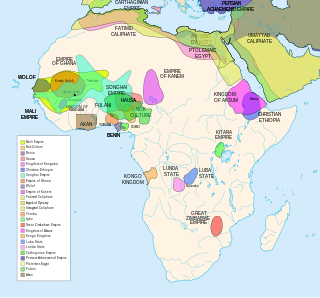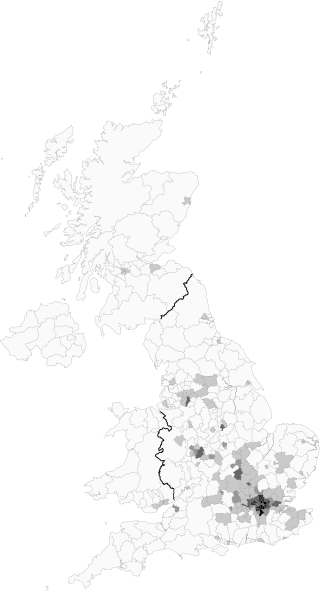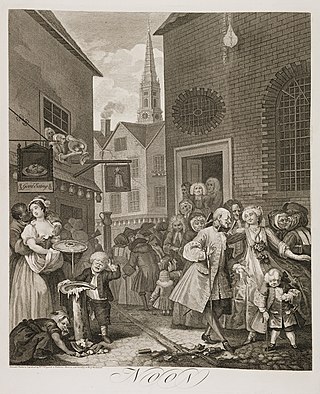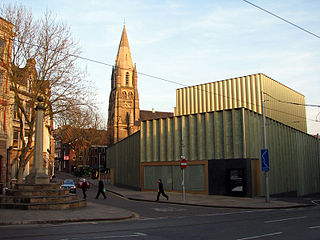Related Research Articles

The history of Africa begins with the emergence of hominids, archaic humans and — around 300,000–250,000 years ago — anatomically modern humans, in East Africa, and continues unbroken into the present as a patchwork of diverse and politically developing nation states. The earliest known recorded history arose in Ancient Egypt, and later in Nubia, the Sahel, the Maghreb, and the Horn of Africa.

Adam John Hart-Davis is an English scientist, author, photographer, historian and broadcaster. He presented the BBC television series Local Heroes and What the Romans Did for Us, the latter spawning several spin-off series involving the Victorians, the Tudors, the Stuarts and the Ancients. He was also a co-presenter of Tomorrow's World, and presented Science Shack.
Nubians are a Nilo-Saharan ethnic group indigenous to the region which is now Northern Sudan and Southern Egypt. They originate from the early inhabitants of the central Nile valley, believed to be one of the earliest cradles of civilization. In the southern valley of Egypt, Nubians differ culturally and ethnically from Egyptians, although they intermarried with members of other ethnic groups, especially Arabs. They speak Nubian languages as a mother tongue, part of the Northern Eastern Sudanic languages, and Arabic as a second language.

Diarmaid Ninian John MacCulloch is an English academic and historian, specialising in ecclesiastical history and the history of Christianity. Since 1995, he has been a fellow of St Cross College, Oxford; he was formerly the senior tutor. Since 1997, he has been Professor of the History of the Church at the University of Oxford.

Cheddar Man is a human male fossil found in Gough's Cave in Cheddar Gorge, Somerset, England. The skeletal remains date to around the mid-to-late 9th millennium BC, corresponding to the Mesolithic period, and it appears that he died a violent death. A large crater-like lesion just above the skull's right orbit suggests that the man may have also been suffering from a bone infection.

Alex Jeremy Tudor is an English former professional cricketer who spent two spells with Surrey County Cricket Club as well as playing for Essex. He is a right-handed batsman and a right-arm fast bowler. He was twice awarded the NBC Denis Compton Award during the 1997 and 1998 seasons. A highly talented performer with bat and ball, his career was hampered by frequent injury trouble.

Black British people are a multi-ethnic group of British citizens of either African or Afro-Caribbean descent. The term Black British developed in the 1950s, referring to the Black British West Indian people from the former Caribbean British colonies in the West Indies sometimes referred to as the Windrush Generation and people from Africa, who are residents of the United Kingdom and are British citizens.

The history of African presence in London may extend back to the Roman period.

Nottingham Contemporary is a contemporary art centre in the Lace Market area of Nottingham. The gallery opened in 2009.

Nubia is a region along the Nile river encompassing the area between the first cataract of the Nile and the confluence of the Blue and White Niles, or more strictly, Al Dabbah. It was the seat of one of the earliest civilizations of ancient Africa, the Kerma culture, which lasted from around 2500 BC until its conquest by the New Kingdom of Egypt under Pharaoh Thutmose I around 1500 BC, whose heirs ruled most of Nubia for the next 400 years. Nubia was home to several empires, most prominently the Kingdom of Kush, which conquered Egypt in the eighth century BC during the reign of Piye and ruled the country as its 25th Dynasty.
Ruth Goodman is a British freelance historian of the early modern period, specialising in offering advice to museums and heritage attractions.
Washing the EthiopianWhite is one of Aesop's Fables and is numbered 393 in the Perry Index. The fable is only found in Greek sources and, applied to the impossibility of changing character, became proverbial at an early date. It was given greater currency in Europe during the Renaissance by being included in emblem books and then entered popular culture. There it was often used to reinforce outright racist attitudes.

Suzannah Rebecca Gabriella Lipscomb is a British historian and professor emerita at the University of Roehampton, a Fellow of the Royal Historical Society, the Higher Education Academy and the Society of Antiquaries, and has for many years contributed a regular column to History Today. She has written and edited a number of books, presented numerous historical documentaries on TV and is host of the Not Just the Tudors podcast from History Hit. She is also a royal historian for NBC.

John Blanke was a musician of African descent in London from the early Tudor period, who probably came to England as one of the African attendants of Catherine of Aragon in 1501. He is one of the earliest recorded black people in what is now the United Kingdom after the Roman period. His name may refer to his skin colour, derived either from the word "black" or possibly from the French word "blanc", meaning white.

Blackamoores: Africans in Tudor England, their Presence, Status and Origins is a 2013 non-fiction book by British historian and writer Onyeka Nubia that explores the history of Black people in Tudor-era England. Based on a study of 250,000 documents during 10 years of research, the book became part of a campaign by a Waltham Forest community group targeted at the UK government to diversity Britain's education curriculum.

Casper Van Senden was a German merchant who was active in Tudor-era England during the 16th century. Born in the German city of Lübeck, he eventually moved to the English capital of London, a major port at the time. Working as a merchant in Hanseatic League, he rose to prominence in 1596 by ensuring the safe return of 89 English subjects who were detained in the Iberian Union. This brought Van Senden to the attention of Queen Elizabeth I, as he entered her court to seek compensation.
5Select is a British free-to-air television channel which features documentaries, arts, dramas, comedies and Channel 5 original content. It is owned by Channel 5 Broadcasting Limited, a wholly-owned subsidiary of Paramount Global, which is grouped under Paramount Networks UK & Australia division.

Ellen or Elen More was an African servant at the Scottish royal court. She probably arrived in Scotland in the company of a Portuguese man with imported animals. There are records of clothing and gifts given to her, although her roles and status are unclear. Some recent scholarship suggests she was enslaved, and her arrival in Scotland can be linked indirectly with the slave trade. She is associated with a racist poem by William Dunbar, and may have performed in Edinburgh as the "Black Lady" at royal tournaments in 1507 and 1508.

Henry or Henrie Anthonie Jetto was a black English yeoman, the earliest-known black person with an extant will in England and the earliest to have resided in Worcestershire.

A number of people of African origin were recorded as servants at the Royal Court of Scotland during the 16th-century, forming a notable African presence at the Scottish royal court. The accounts include gifts of clothing. The American scholar Kim F. Hall has characterised these people as "dehumanised alien curiosities", and their histories, roles at court, and their relationships with communities, are the subject of continuing research and debate.
References
- ↑ "Fellows – N" (PDF). Royal Historical Society . Retrieved 1 September 2020.
- ↑ "Theory of WAR", Voice, August, 1998 p. 40
- ↑ Study of African genes
- ↑ "Onyeka Nubia". University of Nottingham. Retrieved 9 August 2017.
- ↑ https://core.ac.uk/download/pdf/77028773.pdf
- ↑ "2009 Award Winners". African Achievers International. Archived from the original on 4 August 2009. Retrieved 24 December 2017.
- ↑ "Study of African genes: who stands to gain most from it?". Voxafrica.com. 5 November 2009. Archived from the original on 15 May 2009. Retrieved 24 December 2017.
- ↑ "Onyeka Nubia". Department of History. The University of Nottingham. Retrieved 2 January 2024.
- ↑ "Walking Victorian Britain Season 1". Radio Times. Archived from the original on 24 October 2021. Retrieved 24 May 2023.